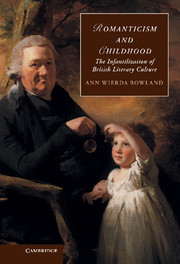Romantic Poets and the Culture of Posterity
$60.99 (C)
Part of Cambridge Studies in Romanticism
- Author: Andrew Bennett, University of Bristol
- Date Published: November 2006
- availability: Available
- format: Paperback
- isbn: 9780521026895
$
60.99
(C)
Paperback
Other available formats:
Hardback, eBook
Looking for an examination copy?
This title is not currently available for examination. However, if you are interested in the title for your course we can consider offering an examination copy. To register your interest please contact [email protected] providing details of the course you are teaching.
-
This 1999 book examines the way in which the Romantic period's culture of posterity inaugurates a tradition of writing which demands that the poet should write for an audience of the future: the true poet, a figure of neglected genius, can be properly appreciated only after death. Andrew Bennett argues that this involves a radical shift in the conceptualization of the poet and poetic reception, with wide-ranging implications for the poetry and poetics of the Romantic period. He surveys the contexts for this transformation of the relationship between poet and audience, engaging with issues such as the commercialization of poetry, the gendering of the canon, and the construction of poetic identity. Bennett goes on to discuss the strangely compelling effects which this reception theory produces in the work of Wordsworth, Coleridge, Keats, Shelley and Byron, who have come to embody, for posterity, the figure of the Romantic poet.
Read more- Broad-based survey of the major Romantic poets and their poetics (including a chapter on women writers)
- Expands on the theme of his well-reviewed earlier book Keats, Narrative and Audience
- Combines critical, historical and theoretical perspectives on Romantic poetry
Reviews & endorsements
"Bennett examines how the Romantic period's culture of posterity fostered a tradition of writing in which poets wrote to establish their identity for an audience of the future."
-M.S. Johnston, ChoiceSee more reviews"‘Romantic Poets and the Culture of Posterity addresses mostly authors and texts that have received extensive critical attention in the past; but, fittingly, by reorientating attention to them, the book makes them live in additional ways...the book should assure itself a long critical afterlife."
-Michael Wiley, The Wordsworth Circle"‘Bennett’s study ‘opens a window onto fascinating and vertiginous critical prospects.’"
-Michael O’Neill, TLS"Andrew Bennett’s fascinating book grapples with theories of Romantic reception, both as those theories emerged and were simultaneously problematized in the period itself, and as they continue to influence our own readings of Romanticism today...Bennett is a pleasure to read. Clear, airy sentences and scrupulous signposting assist an involved and involving argument."
-Richard Marggraf Turley, The British Journal of Eighteenth-Century Studies"The strength of this book is its comprehensiveness. Bennett not only reads the expected poets and those, like Landon and Hemans, recently decanted into the canon; we also read about Henry Kirke White...and Isabella Lickbarrow. Its discussions are convincing, always aware of their larger implications for literary study and quite readable. Bennett is attuned to the ways in which his own – and our – reading is still caught up in the fantasy of posthumous fame."
-James Najarian, Romantic Circles"As is not infrequently true of fine-boned deconstruction, the scrupulous attention to the self-entwining possibilities of language lends at times an almost aesthete quality to the prose...Bennett is an extremely accomplished practitioner of his brand of dark interpretation."
-Seamus Perry, Review of English StudiesCustomer reviews
Not yet reviewed
Be the first to review
Review was not posted due to profanity
×Product details
- Date Published: November 2006
- format: Paperback
- isbn: 9780521026895
- length: 288 pages
- dimensions: 228 x 152 x 20 mm
- weight: 0.44kg
- availability: Available
Table of Contents
Acknowledgements
List of abbreviations
Introduction
Part I:
1. Writing for the future
2. The Romantic culture of posterity
3. Engendering posterity
Part II:
4. Wordsworth's survival
5. Coleridge's conversation
6. Keats's prescience
7. Shelley's ghosts
8. Byron's success
Afterword
Notes
Index.
Sorry, this resource is locked
Please register or sign in to request access. If you are having problems accessing these resources please email [email protected]
Register Sign in» Proceed
You are now leaving the Cambridge University Press website. Your eBook purchase and download will be completed by our partner www.ebooks.com. Please see the permission section of the www.ebooks.com catalogue page for details of the print & copy limits on our eBooks.
Continue ×Are you sure you want to delete your account?
This cannot be undone.
Thank you for your feedback which will help us improve our service.
If you requested a response, we will make sure to get back to you shortly.
×










